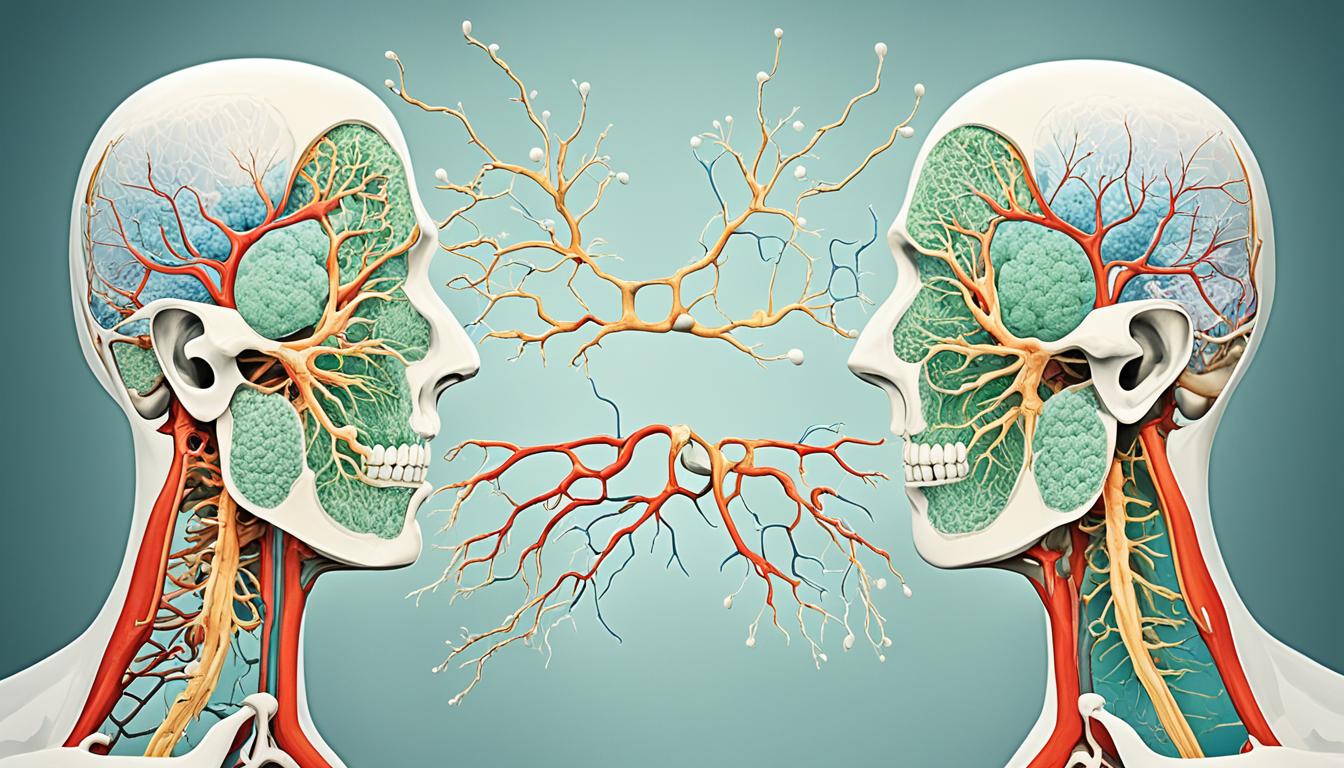Hypercortisolism or Cushing’s syndrome happens when the body has too much cortisol. It’s a rare condition named after the neurosurgeon Harvey Cushing. He first talked about it in 1932. This issue can occur because of tumors in the adrenal or pituitary glands.
Too much cortisol causes various problems. These include putting on weight, high blood sugar, weaker bones, and changes in mood. Doctors find hypercortisolism through blood and urine tests, imaging, and suppressing cortisol to find the source.
Surgery to remove tumors, medicines to balance cortisol, and sometimes stem cell therapy can help. These are the main treatments for this condition.
Key Takeaways:
- Hypercortisolism, also known as Cushing’s syndrome, is a rare endocrine disorder.
- Excessive cortisol levels can lead to various symptoms and complications.
- Diagnosis involves blood and urine tests, imaging studies, and suppression tests.
- Treatment options may include surgery, medication, and stem cell therapy.
- Effective management of hypercortisolism requires a multidisciplinary approach.
Causes and Risk Factors of Hypercortisolism
Hypercortisolism is also known as Cushing’s syndrome. It comes from various causes and risk factors. Learning about these is key to effectively treating the condition.
Pituitary Gland Tumor
A major cause is a tumor in the pituitary gland. This tumor makes too much adrenocorticotropic hormone (ACTH). As a result, the adrenal glands produce too much cortisol.
Adrenal Tumor
An adrenal tumor is another key cause. These tumors make cortisol on their own. This happens even without ACTH telling them to, causing high cortisol levels.
Corticosteroid Use
Using corticosteroid drugs for a long time can also cause hypercortisolism. These drugs are often for conditions like asthma, lupus, and arthritis.
Hereditary Tumors and Gene Mutations
Certain genetic mutations can lead to inherited Cushing’s syndrome. Hereditary tumors like those seen in MEN1, MEN4, FIPA, and Carney complex increase the risk.
Stress and Chronic Inflammation
Long-term stress and inflammation are also risk factors. They can mess up the body’s cortisol balance, leading to too much cortisol.
Cancer
Cancerous growths that make extra cortisol can also cause hypercortisolism. These tumors are found in places like the pancreas, lungs, and thymus.
To properly treat hypercortisolism, it’s crucial to know its causes and risks. Next, we’ll look at the signs, tests, and treatments for this condition.
Symptoms, Diagnosis, and Treatment of Hypercortisolism
Hypercortisolism is also known as Cushing’s syndrome. It brings many symptoms and issues. People might have too much sugar in their blood and get sick more often. Their muscles and bones might get weaker, making them likely to break. Heart problems, like high blood pressure, and high cholesterol can show up. Weight gain, thin skin, purple stretch marks, and acne are also signs. Feeling very tired, having trouble with periods for women, and erectile dysfunction for men are other effects.
Doctors use blood and urine tests to diagnose this syndrome. They also do special tests and look inside the body to find the cause. The treatment changes based on what’s causing the problem. It might involve surgery, medicines, or sometimes stem cell therapy.
Treatment for Cushing’s syndrome is personalized. Doctors try to fix the body’s balance, improve the immune system, and stop harmful effects. Treatment includes changing how you eat, taking medication, and watching hormone levels closely. Surgery might be needed to get rid of the problem area. Stem cell therapy offers hope to get the hormones back to normal and help people feel better.

